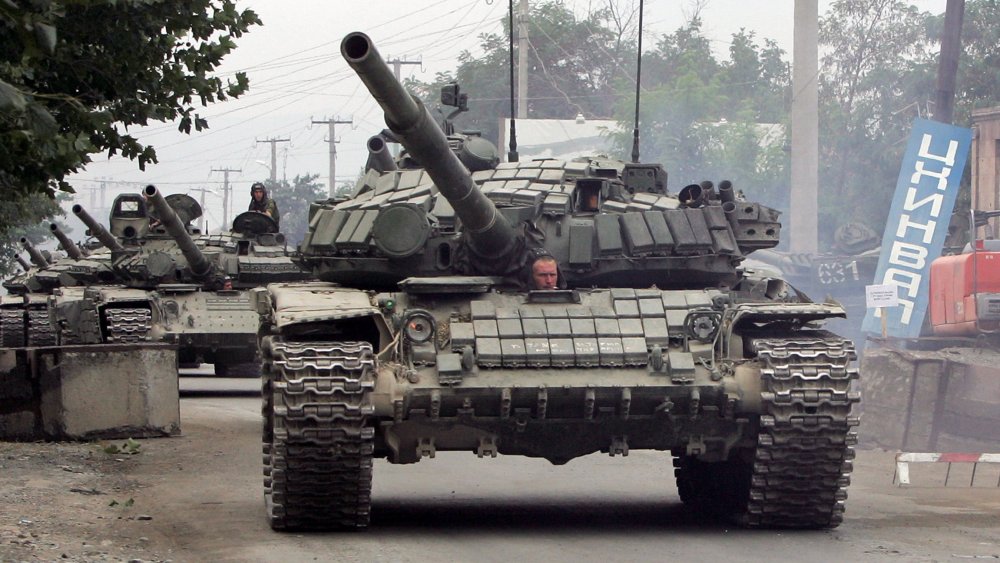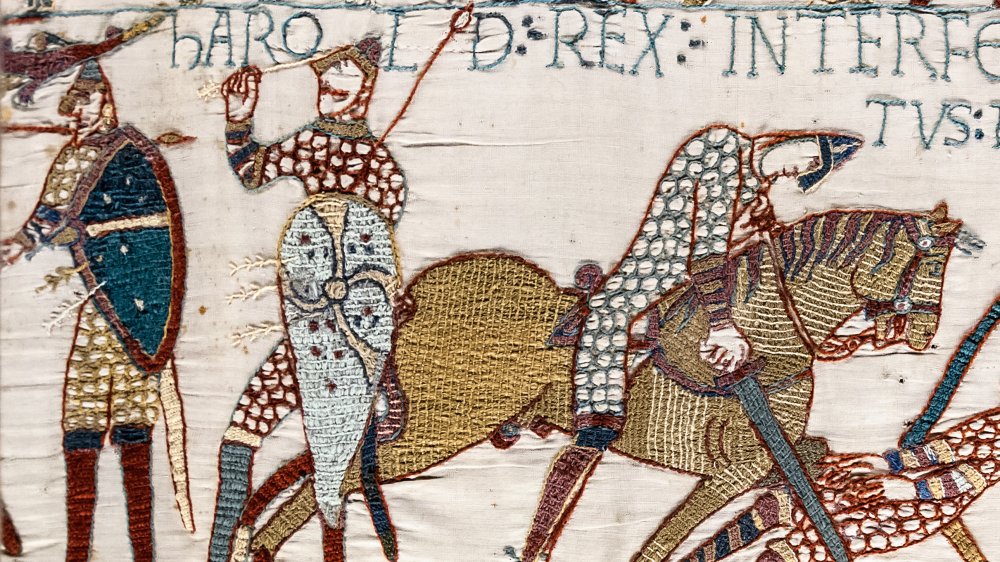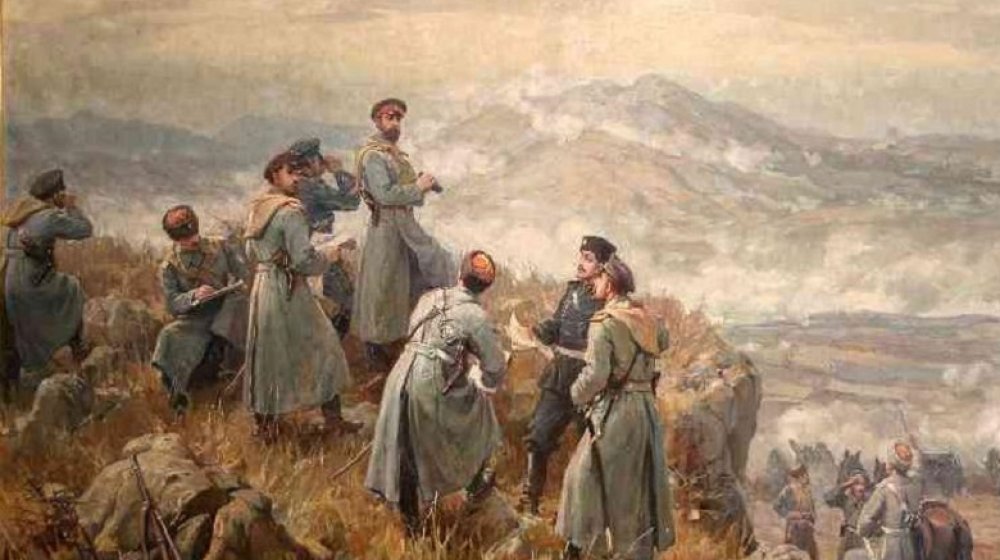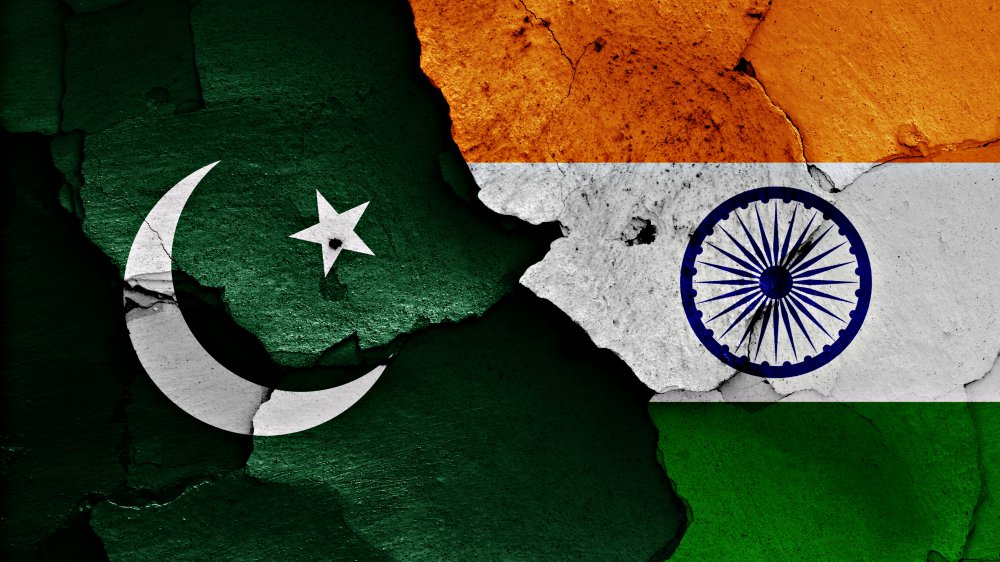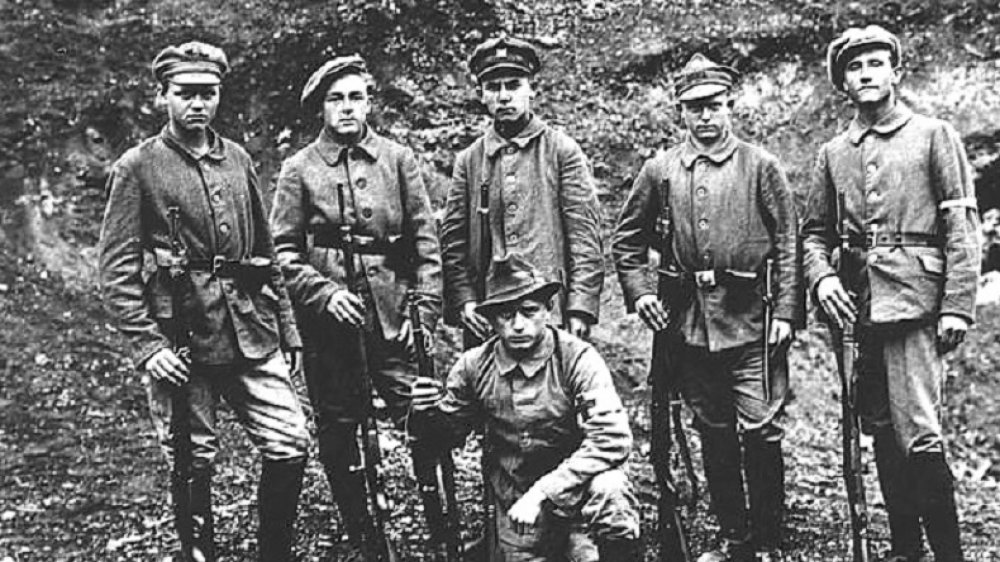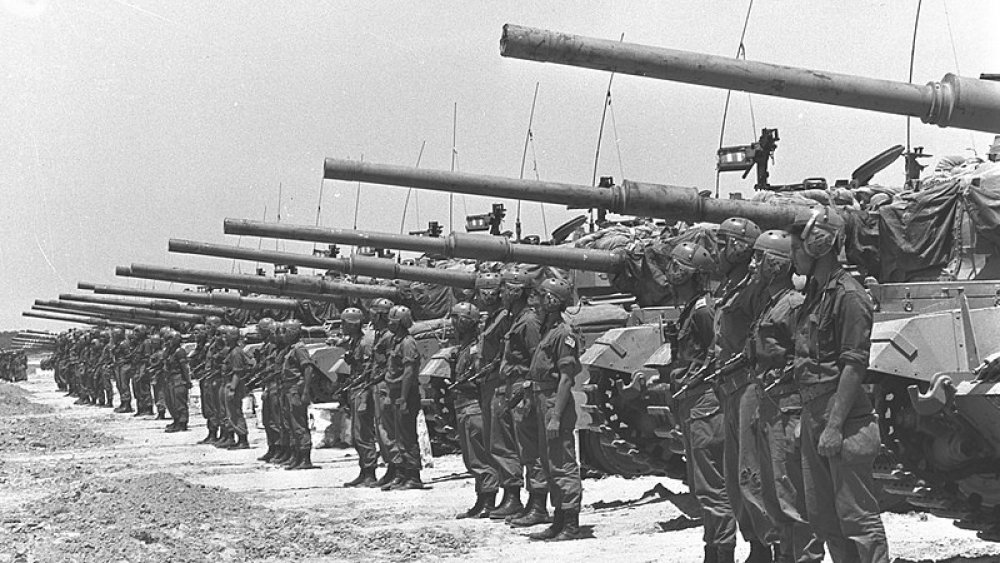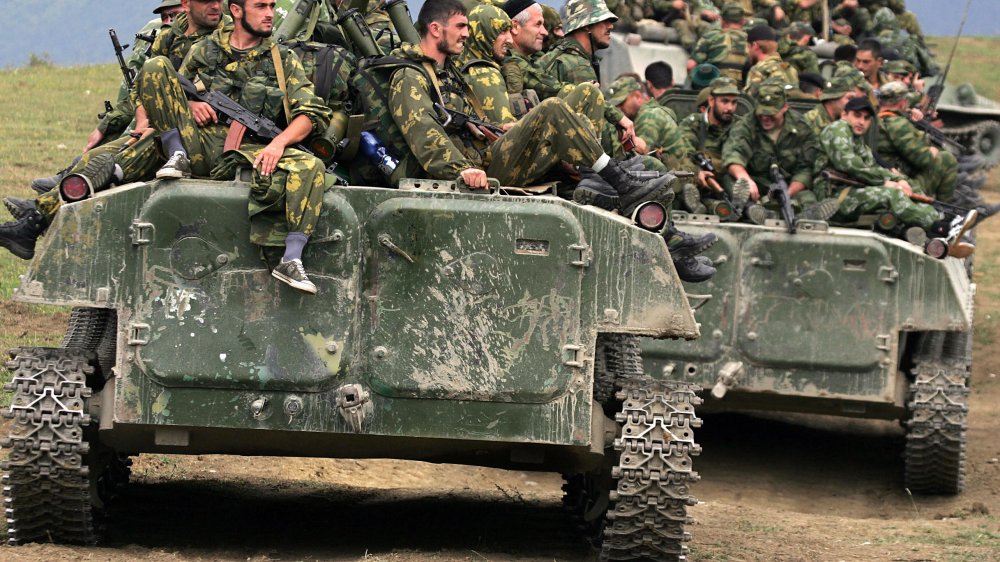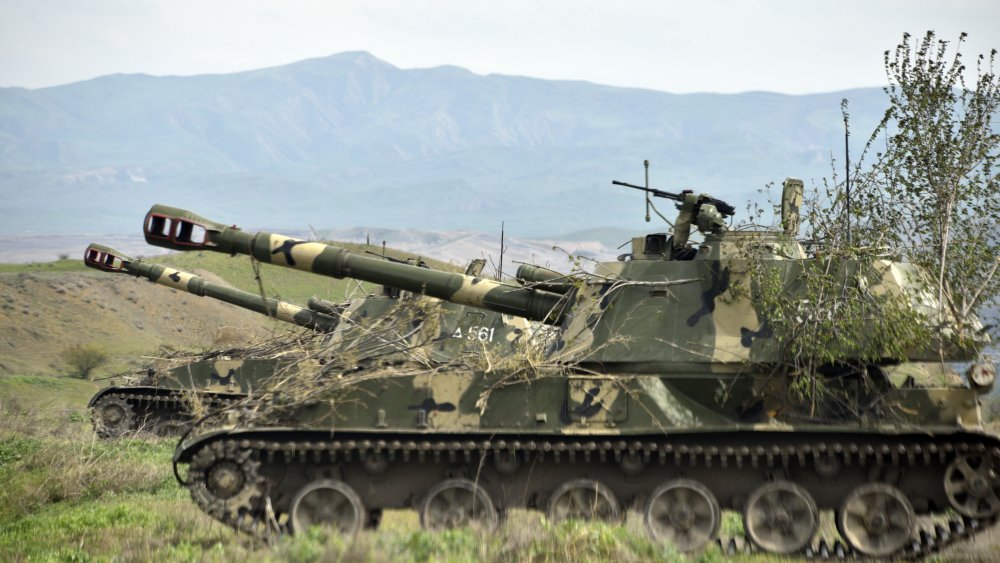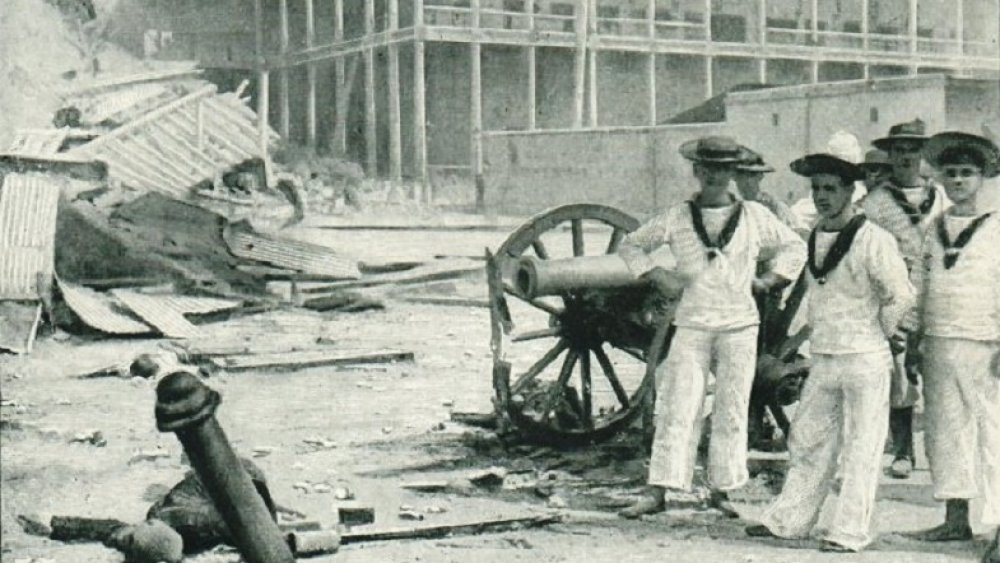The Tragic History Of The World's Shortest Wars
No one wants a war. But if you're gonna have one, you might as well make it a short one, right? Like, there's a reason no one ever responds to the question, "What historical era would you visit if you had a totally rad time machine?" with, "Dude, I've always wanted to experience life during the Thirty Years' War." War is hard, fighting sucks, and getting killed by a marauding army really, really sucks. While shorter wars may still feature killing and explosions, at least there are less of them. After all, there are only so many hours for death in a day, right?
Oh boy, did you ever click on the wrong article. While short wars with World War I- or World War II-style death tolls are mercifully non-existent, that doesn't mean they're any less tragic than their bigger cousins. Sometimes, the conflict itself is spectacularly bloody. Othertimes, it's what caused the war or what the war led to that's the depressing bit. They often say it's not how long it is that matters, it's what you do with it. In the case of history's shortest wars, what they did with it was sow endless misery.
The Norman Conquest of 1066 lasted 17 days
It's hard to think of any world leader who so unquestionably earned his nickname as William the Conqueror. In 1066, William took his Norman fleet and sailed for Britain. Just 17 days after landing, he'd killed England's King Harold and taken over. But there's a tragic reason William was able to make mincemeat of Harold's army so easily, one that usually gets forgotten. Harold had only just finished fighting his own brother to the death.
According to Historic UK, when William invaded, Harold had been king for mere months. Many felt he was useless at it, including his own brother, Tostig. Per Britannica, Tostig had been exiled by Harold in 1065 for mismanaging Northumbria. Being something of a tool, Tostig had used his exile to stomp around Europe looking for someone to help him invade England. He'd even asked William, but the Conqueror hadn't been quite ready yet to go to war. So Tostig had ended up joining forces with a Norwegian king and attacking York.
This turned out to be a dreadful idea when Harold quickly marched his army north and defeated them both in battle on September 25. Unfortunately, the epic battle left Harold's troops exhausted, injured, and in many cases, dead. But rather than have time to recover, they had to about face and quick march all the way to southern England to face the well-rested Norman invaders. That battle ended with Harold catching an arrow through the eye and William earning his nickname.
The Serbo-Bulgarian War raged for just 14 days
In 1878, the Congress of Berlin resulted in the Ottoman Empire getting mostly pushed out the Balkans to the general delight of everyone. The newish states of Serbia and Bulgaria were hoping this would lead to them increasing their territory in the region ... only to watch in horror as the continental powers said, "Nope!" Bulgaria actually lost its territory of Eastern Rumelia, which was handed back to the Ottomans. So far, so sour. But then, in 1885, Bulgarians in Eastern Rumelia staged a coup and reintegrated the province into Bulgaria. This left Serbia as the only state stuck without any new land. So Serbian King Milan Obrenović IV decided Bulgaria would just have to share Eastern Rumelia. When they refused, he declared war.
According to Britannica, since Serbia was the better-armed, more important state, it was assumed that King Milan would kick Bulgaria's butt all up and down the Balkans. But no. Instead, Bulgaria surprised the world by defeating the Serbian army at Slivnitsa just four days after war was declared and then invading Serbia. The war ended ten days later when the slumbering giant of the Austro-Hungarian Empire awoke and chased Bulgaria out of its back yard.
Grim as the war was from a body count perspective (some accounts have it as 6,800 Serbians and 2,300 Bulgarians), it was even worse from a Serbian domestic point of view. King Milan's defeat eventually saw him replaced by his tyrannical teenage despot of a son.
The Indo-Pakistan War of 1971 went for a mere 13 days
Less than two weeks. That's how long it took India to break Pakistan's air force in 1971, blockade the east of the country, and force Islamabad to surrender nearly 150,000 sq km of territory to rebel forces (via Global Security). Two weeks! Most of us probably have fortnights where we barely do anything except work and binge-watch Netflix. And here's India, helping found the state of Bangladesh in the same time frame. Yeesh.
The cause of the war was technically Pakistan's bombing of India's airfields on December 3, but the 13-day conflict actually had much darker roots. Since March 1971, Pakistan had been locked in conflict with East Pakistan (now Bangladesh) over the region's separatism. Delhi was only pressured to take the war to Pakistan after Islamabad started committing genocide.
The Bangladesh genocide was one of the worst atrocities of the post-World War II era. As Smithsonian explains, Pakistani soldiers committed endless war crimes against the East Pakistani population, resulting in anywhere between 500,000 and 3 million dead, the higher figure on a par with the far more famous Cambodian genocide. Over 200,000 women may have been systematically sexually assaulted. That this catastrophe ended was only due to Pakistan's ill-judged bombing of India and the 13-day war that followed. So you know that old question that goes, "War, what is good for?" Well, sometimes, the answer is "a lot."
The War of the Stray Dog was only 11 days
It may sound like a cutesy episode from a bizarrely conflict-obsessed children's book, but the War of the Stray Dog was anything but sweet. In 1925, as tensions between the two countries were at their highest, a young Greek soldier chased a stray dog that had run a couple of meters into Bulgarian territory. Bulgarian soldiers opened fire, killing the poor man. When his superior approached the Bulgarian border with a white flag to discuss things, the Bulgarians shot and killed him, too. And so began a brief war which saw Greece invade and occupy Bulgaria's border regions, killing about 50 civilians.
In the aftermath of World War I, in which Greece and Bulgaria had been on opposing sides, feelings between the two nations didn't so much hit a low point as plunge into a black hole of endless despair. Bulgarian extremists launched raids into Greece, and in 1923, when Bulgarian prime minister Aleksandar Stamboliyski tried to improve relations with Athens, those same extremists abducted, tortured, and murdered him. Perhaps it's not surprising the Bulgarian guards were ready to shoot a guy just following his dog.
The Greek occupation only ended when the League of Nations (kind of like the UN but in silent movie times) intervened and forced Athens to retreat over the border. The end result was 50 civilians and two soldiers. No word on what happened to the dog.
As the name implies, the Ten-Day War was pretty short
The breakup of Yugoslavia in the 1990s was less a regular breakup and more everyone trying their absolute hardest to smash everything to smithereens, stomp on the pieces, and then stomp on them some more. After decades under communism, the state of Yugoslavia opened itself up to free elections, returning aggrieved nationalist governments in most of its republics (Slovenia, Croatia, Serbia, Bosnia-Herzegovina, Macedonia, and Montenegro). These aggravated nationalists then did what nationalists tend to do and fanned the flames of mutual resentment. By 1991, nearly all the republics were ready to split. The only question was who would go first.
In the end, Slovenia and Croatia went together (via Rick Steves' website). On June 25, 1991, both nations unilaterally seceded from Yugoslavia. But while Croatia's departure kicked off a conflict that lasted until 1995, the Slovenian war was done and dusted in ten days. Soon after, Serbia attacked the republic. On July 7, with fewer than 100 deaths recorded, Slovenia and Yugoslavia signed a peace treaty.
One of the reasons the war was so short was that Slovenia's locals formed militia units that isolated and attacked Yugoslav barracks. But there were other, darker reasons. While Slovenia contributed to Yugoslavia's GDP, Croatia with its long coastline was the real prize. Freeing up their units from Slovenia meant Serbia had more firepower to use against Croatia and, later, Bosnia. These latter two conflicts would claim over 20,000 and over 100,000 lives, respectively.
The Czech-Polish War ran for seven days
At the end of World War One, a whole ton of empires collapsed into a billion jagged fragments. Some of those fragments split off neatly and formed little ready-shaped countries. Others wound up with shattered edges, meaning you couldn't tell where one nation ended and another began. One such edge was Silesia, a coal-rich stretch of industrial landscape on the border between Poland and Czechoslovakia. In early 1919, both countries gave up legal attempts to try and claim the territory and went to war.
According to Radio Prague, when Poland and Czechoslovakia both rose from the ashes of World War One, they signed a tentative agreement dividing Teschen Silesia, with its vital coal deposits. But because negotiations were handled by regional leaders, Prague dismissed them as too accommodating to the Poles. When Warsaw started acting like it owned the place regardless, Prague invaded. The resulting border war lasted just a week before the Czechoslovaks declared victory. But in the long run, that victory would doom them.
For the next couple of decades, Poland and Czechoslovakia refused to trust one another. This became a major problem in the 1930s, when a guy called Hitler started eyeing up some eastern real estate. Because of their mutual loathing, Prague and Warsaw were unable to present a united front against Berlin, making it easier for Nazi Germany to separately pick them off. The law of unintended Hitler consequences strikes again.
The Six-Day War was a short skirmish that changed the Middle East forever
The Six-Day War is the celebrity of short wars. We all know the basic facts, about how Syria, Egypt, and Jordan went to war against Israel in 1967, only to watch in horror as Israel pulverized their armies and swiped their territory. You may even know the aftermath, how it contributed to the collapse of Pan-Arab Nationalism and the rise of political Islam. But you may not know about the machinations that led to this quick, bloody war. Rather than originating in Cairo or Tel Aviv, its seeds were sown all the way up in Moscow.
According to the BBC, Egypt and Syria were client nations of the USSR, then one of the world's two superpowers. While they certainly had an institutional hatred of Israel, war wasn't totally inevitable. That changed on May 13, 1967. That day, the USSR sent an urgent warning to Cairo that Israel was about to attack. While this wasn't true, it had the desired effect. The Soviet warning started the dominoes toppling. Three weeks later, the region was at war.
Why did the USSR want to ignite the Middle East? According to a CIA source at the Kremlin, the expectation was the USA would have to get involved to help Israel, thereby bogging America down in yet another quagmire alongside Vietnam. What nobody from the Soviets to the Egyptians to the Americans foresaw was that Israel would win so quickly. Not that Moscow ever suffered for sending its clients on a suicide mission.
The Russo-Georgian War was over in five days
Back in the mid-2000s, a bunch of factors very quickly came together in the Caucasus that would erupt into bloody conflict. In 2004, the former Soviet nation of Georgia elected a pro-West president, which freaked Moscow out about declining influence. At the same time, unrest began to worsen in the separatist Georgian region of South Ossetia. When Moscow began clandestinely supporting the separatists, Georgia's president embarrassed Russian president Vladimir Putin by having four Russian officers arrested. By 2008, tensions between the two nations were at boiling point.
So Putin decided he might as well crank the heat right up. According to History, the Kremlin struck a secret agreement with the South Ossetians that year, encouraging them to provoke Georgia. And by August 8, Georgia was feeling so provoked that it had moved its military into the region. The moment the first shell hit South Ossetia, the Russian army attacked. In five short days, Putin's forces steamrollered across the country, until they were just 48 kilometers from the Georgian capital. By the time a cease-fire was called, 850 people were dead.
The worst part? This one short war likely led to many more deaths. Because the West didn't help Georgia in '08, Putin felt he'd been given a blank check to do whatever he liked in the old USSR. When Ukraine went pro-West and anti-Moscow just six years later, Putin didn't stop the invasion after just five days. Since 2014, the Russian-backed conflict in the Donbass region has killed over 13,000 (via RFERL).
The Four-Day War was short yet devastating
The seeds of 2016's Four-Day War were sown many, many years beforehand, right about the time the Soviet Union gave a sigh and collapsed into dust. Down in the Caucasus, this led to the creation of three new countries: Georgia, Azerbaijan, and Armenia. Sadly, not everyone felt the new borders that appeared overnight really reflected reality. In Nagorno-Karabakh, the local Armenians felt they should be in Armenia and not Azerbaijan, where they'd ended up. Armenia agreed, and the two states went to war to settle the issue.
From 1991 to 1994, intensive fighting shattered the region. At last, a ceasefire was agreed, but no peace deal was ever signed. Nagorno-Karabakh remained within Azerbaijan but effectively under the control of Armenia, no one was happy, and everyone still hated each other's guts. As The National Interest details, this led to repeated cross-border skirmishes that lasted for years. Then, on April 2, 2016, one of those skirmishes went too far. The Azeri army unexpectedly captured some territory in Nagorno-Karabakh. Armenia responded by declaring war.
The resulting dust-up was both depressing and pointless — depressing because it killed nearly 200 people, and pointless because it sorted nothing. Barely had the guns started firing than Moscow stepped in, knocked everyone's heads together, and told them to sign a peace treaty now or star in the sequel to the Russo-Georgian War. A few years on, Nagorno-Karabakh remains disputed, and the potential for conflict is as high as ever
The Football War had a duration of 100 hours
The Football War has a reputation for being one of the silliest wars in history. Like, these guys literally went to war over a football match (aka soccer match)! As you've probably guessed though, things weren't so simple. Although football was the trigger, relations between El Salvador and Honduras were already so strained that a war was probably inevitable.
Per the BBC, both nations in 1969 were lorded over by a narrow, landowning elite, while everyone else lived in poverty. In tiny El Salvador, the problem of no available land was so acute that peasants were migrating to larger Honduras to find work. But Honduras also had the same "narrow, landowning elite, lots of starving peasants" problem, so the arrival of the Salvadorans squeezed Honduran peasants hard. Rather than reform, elites in both countries twisted the narrative so the fault lay not with their land-hoarding, but with all these immigrant Salvadorans/immigrant-hating Hondurans. Whipped up by the media, citizens in both countries soon saw the others as monsters who either took their jobs or denied them vital work.
Amid this toxic atmosphere, El Salvador narrowly beat Honduras to qualify for the World Cup. Their dreams crushed, the Honduran fans rioted. Around 12,000 Salvadorans fled the country, whipping up so much fury back home that San Salvador had no choice but to declare war. Talk about a sports rivalry going too far. Thousands were killed before neighboring nations could force a ceasefire upon the two. Maybe the real tragedy is that we remember this bloodshed as something silly.
The Anglo-Zanzibar War is the shortest war in history
Here it is, officially the shortest war in history. In August 1896, the British tried to install a puppet ruler in Zanzibar. The rightful sultan, Prince Khālid, flew into a rage at all these colonial jerks interfering, and he barricaded himself in his palace. Unfortunately, the Royal Navy had five ships already in the harbor. They told Khālid to surrender by 9 AM, or London would declare war. Khālid thought they were bluffing. They weren't. At 9 AM, the Navy began bombarding the palace. Within less than 40 minutes, 500 people had been killed, and Khālid had surrendered and fled for the safety of the German embassy. And that was it for the Anglo-Zanzibar War.
While the deaths of 500 people at the hands of colonial oppressors sure is tragic, it's worth noting that the British didn't go to war against Prince Khālid just because they were imperialist creeps. Khālid was a staunch supporter of slavery, and it was British policy in 1896 to stamp slavery out.
According to Britannica, there's no doubt London acted badly in Zanzibar, forcing the nation to be divided between Germany and Britain. On the other hand, that nation was one engaging in the brutal, racist practice of enslaving other humans, and Khālid was as pro-slavery as Calvin Candie. Within hours of winning the war, the Brits had installed their own sultan and permanently outlawed slave-owning on the island of Zanzibar. Darn it, history, why do you have to be so nuanced?
